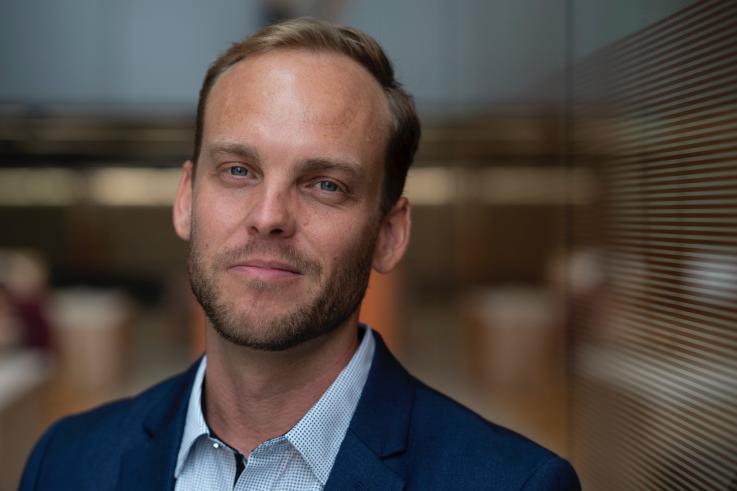This summer, North American beaches were the top destination for US travelers. And it’s easy to understand why. Not only does the ocean offer a fun respite from the summer heat (and pandemic lockdown), research shows that spending time at the coast can positively impact physical and mental health.
Sadly, these benefits can come with serious costs. According to the World Health Organization, drowning is the third leading cause of unintentional injury death worldwide. Despite how widespread and pressing this problem is, beach and water safety remains largely overlooked as both a public health issue and research discipline.
Will Koon, a 2017 MPH in Global Health graduate and Southern California native, wants to change that.
“I grew up at the beach. I was so lucky and privileged to be able to have a childhood that involved lots of time in the ocean, and the fact that people get hurt and die in a place that should be full of fun is gut wrenching to me,” Koon said during a recent phone interview from his home in Sydney, Australia, where he is a co-founder of the Beach Safety Research Group and a PhD Candidate in the School of Biological, Earth and Environmental Sciences at the University of New South Wales (UNSW).
Koon started working as an ocean lifeguard in Southern California as a teenager. After college, he began coordinating and teaching ocean lifeguard training programs in Central and South America. During that experience, he identified significant gaps in the design, delivery, and sustainability of lifeguard development initiatives and other beach safety efforts, especially in resource limited communities where lifeguards were underpaid, volunteering, or nonexistent.
“I started to really question the long-term impact of what I was involved with and what I was doing, and I knew that I needed to develop my skillset if I wanted to make a difference,” said Koon.
Looking for a framework with which to approach the problems he was observing, Koon decided to pursue a master’s degree in global health. He moved to Seattle in order to work with Dr. Linda Quan, a University of Washington professor of pediatrics who Koon describes as “the godmother of drowning research.” He was also drawn to the Department of Global Health Master of Public Health program because of its balanced curriculum, and passionate and experienced students.
Koon’s time at UW helped him to develop a technical skillset not typically associated with lifeguarding or beach safety – including biostatistics, injury epidemiology, GIS analysis, science communication, and data visualization – and to launch a successful drowning prevention and ocean safety consulting practice after graduation based on his thesis project. Since launching his practice, Koon has worked with local governments, hospitals, non-profit foundations, and start-up private enterprises to improve and evaluate operations, training, and programs related to coastal safety and drowning prevention.
“Lifeguards are really good at keeping people safe at the beach, but it’s not in their duty statement to crunch numbers or interpret data. Designing health promotion interventions and programs has not traditionally been part of the lifeguard skillset,” explained Koon.
In his role as a consultant, Koon has developed curriculum programs for lifeguards to teach beach safety in schools, analyzed rescue data to forecast weather and ocean conditions likely to increase risk, conducted in-depth needs assessments for lifeguard training programs and hospital-based injury prevention initiatives, and coordinated conferences to improve multi-sectoral collaboration for water safety.
Not only have these projects improved beach safety, they’ve helped move the ocean lifeguarding profession towards a scientific-evidence and research-based practice. Koon says this shift, which involves the collection, maintenance and use of high-quality data for decision-making and planning, is increasingly important in the context of climate change, which is exacerbating an already complex and profound global health problem by changing the way people interact with the environment.
For example, as water temperatures rise, people may be comfortable swimming in the ocean later in the day. Similarly, rising air temperatures are extending the beach season and turning locations previously too cold for swimming into attractive destinations. Changes in human exposure patterns, combined with changing coastlines and more extreme weather, require careful adjustments to coastal management plans to keep people safe.
“The coast is an interesting dynamic because so much of it is uncontrollable," said Koon. "Theoretically, humans are, but as we know, trying to get humans to control themselves is a really challenging problem.”
The good news is that Koon is well poised to tackle this problem. As a multidisciplinary PhD candidate at UNSW-Sydney, he’s investigating coastal drowning prevention, including evaluating and assessing surfer rescue and school beach safety programs, and conducting epidemiological research in Australia and California to better understand who’s drowning and under what circumstances.
More importantly, Koon is thinking about how to translate the insights from his research into practical solutions so that everyone can enjoy the beach as much as he does.
“My motivation is not only to keep people safe at the beach, but for people to go to the beach and have a blast. We want people to get out and breathe fresh air and exercise and appreciate the ocean, without getting hurt,” said Koon.
Learn more about the UW global health alumni network, which includes more than 460 graduates of DGH degree programs working across five continents to improve health and eliminate health disparities around the world.
